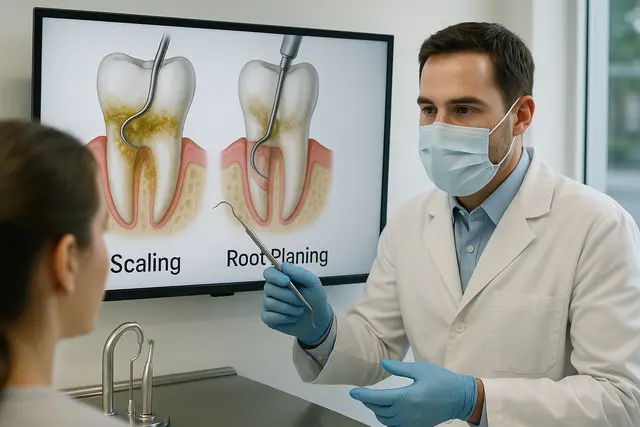General Dentistry
4 min read
Sep 15, 2025
How to Stop Nerve Pain in Tooth: Fast Relief That Works
Tooth nerve pain can be one of the most intense and disruptive types of discomfort. It often strikes without warning and makes everyday activities like eating, drinking, or even talking feel unbearable. Understanding what causes this pain and how to manage it effectively is key to getting fast relief.

Tooth nerve pain can hit like a bolt of lightning, sudden, sharp, and impossible to ignore. If you’ve ever had that throbbing, deep-down ache that makes you wince every time you breathe, chew, or sip your favorite drink, you're not alone. This kind of pain is often a cry for help from the nerves inside the tooth. Let’s walk through what actually works to stop tooth nerve pain fast, whether you’re stuck at home or on your way to see a dentist.
Tooth Nerve Pain Is No Joke
Tooth nerve pain often shows up as a sharp pain or a throb deep inside the tooth. It’s usually caused by exposed or inflamed nerves, thanks to decay, a broken tooth, a deep cavity, or even an old filling gone rogue. Left untreated, that minor throb can turn into severe pain that radiates through your jaw, ear, or head.
The root cause of your pain might be lurking inside the tooth, where the enamel should be your protective armor, but isn’t anymore. And when nerves inside get cranky? You feel every bit of it.
When to See a Dentist
Let’s get this out of the way first: if you're experiencing tooth nerve pain, especially if it’s persistent pain or sensitivity to hot and cold foods, you need to see a dentist. Fast. That pain may be warning you of a serious dental issue like tooth decay or infection.
A dental professional can spot what’s going on beneath the surface, whether that’s a cavity, cracked tooth, or nerve exposure. Treatments for tooth nerve pain may include a filling, root canal, or even an extraction in extreme cases. The goal is to treat the root cause and not just slap a bandage on the symptoms.
How To Soothe Tooth Nerve Pain
Maybe you're waiting for your dentist appointment or it’s 2 AM and your tooth just won't quit. Here’s how to soothe tooth nerve pain and get some temporary relief from tooth nerve pain without losing your mind.
Soothe Tooth Nerve Pain at Home
Thankfully, a few effective home remedies can provide pain relief until you can get professional dental care.
Warm saltwater rinse: It helps reduce inflammation and flush out bacteria.
Hydrogen peroxide rinse: Mix equal parts hydrogen peroxide and water (never use it straight) and gently swish for 30 seconds. This can help relieve pain and reduce inflammation caused by bacteria or infection.
Clove Oil for the Win
Clove oil has been used for centuries for one good reason: it works. This tiny bottle is packed with eugenol, a natural numbing agent that can help relieve tooth nerve pain. Dab a small amount of clove oil on a cotton ball and place it near the affected tooth. You’ll feel it start to numb the area, easing the pain without overdoing it. For more on natural toothache causes and remedies, clove oil is a top performer.
Cold Compress and Ice Pack Options
A cold compress can provide temporary relief from tooth pain by numbing the area and reducing swelling. Hold an ice pack or cold compress to the outside of your cheek near the affected tooth for 15 to 20 minutes. Repeat as needed. This works especially well if the pain and inflammation are caused by trauma or swelling around the gum, such as tooth pain at night.
Hydrogen Peroxide Can Help
Hydrogen peroxide and water mixed properly is not just an old wives’ tale, it’s an effective home remedy that can kill bacteria, reduce decay-related pain, and promote oral health. Just make sure to rinse your mouth thoroughly afterward to avoid irritation.
Tooth Sensitivity and Pain Relief Options
If your pain comes with heightened sensitivity to hot and cold or sugary foods, you might be dealing with enamel erosion or early signs of decay.
Over-the-counter pain relievers like ibuprofen can help relieve pain and reduce inflammation. These pain medications can give you a break from the throb while you wait for your appointment.
And don’t forget to rinse your mouth after eating or drinking, especially if you suspect a cavity or food trapped near the gum is part of the problem.
Peppermint Tea Bags and Other Soothing Helpers
Here's one you might not expect: peppermint tea bags. After steeping one and letting it cool, apply it to the painful tooth or gum area. It has natural numbing properties and a soothing feel that might help relieve pain without the usual side effects of stronger medications.
Preventing Tooth Nerve Pain Before It Starts
The best way to avoid the panic of sudden dental pain? Preventing tooth nerve pain through good habits. Brush and floss daily, schedule regular dental checkups, and skip the sugary snacks that feed decay. Early detection and regular dental care are your best defense against dental issues like tooth nerve pain.
When Home Remedies Aren’t Enough
While these remedies can provide temporary relief, they won’t fix the cause of the pain. Whether it’s a cavity, cracked enamel, or inflamed gum, the only real fix is to see a dentist and treat the root cause. Ignoring persistent tooth nerve pain may lead to more serious issues like infection or even tooth loss.
If your pain keeps coming back or turns into a constant throb, it’s time to book that appointment. Your future self, and your teeth, will thank you.
What Causes Tooth Nerve Pain?
Tooth nerve pain usually happens when the protective enamel or dentin is damaged, exposing or irritating the nerves inside the tooth. Common causes include deep cavities, cracked or fractured teeth, worn enamel, gum disease, or even old fillings that have failed. Once the nerve becomes inflamed or exposed, pain can range from sharp stabs to constant throbbing, often worsening with hot, cold, or sweet foods.
How Can I Relieve Tooth Nerve Pain at Home?
Temporary relief is possible with a few safe home remedies until you see a dentist. Saltwater rinses reduce bacteria and inflammation, while diluted hydrogen peroxide helps kill germs and soothe discomfort. Applying clove oil directly to the affected tooth provides natural numbing. Cold compresses can also ease pain and swelling, especially after trauma. Over-the-counter pain relievers like ibuprofen are effective for reducing inflammation and pain in the short term.
When Should I See a Dentist for Tooth Nerve Pain?
If the pain is persistent, severe, or keeps returning, you should see a dentist immediately. Symptoms like prolonged sensitivity, swelling, or visible decay are signs that professional treatment is needed. A dentist can determine whether you need a filling, crown, root canal, or extraction. Delaying care risks worsening infection, more complicated treatment, and even tooth loss.
Can Tooth Nerve Pain Be Prevented?
Yes, tooth nerve pain is often preventable with consistent oral care. Brushing twice daily with fluoride toothpaste, flossing, and avoiding excessive sugar helps protect enamel from decay. Regular dental checkups allow early detection of cavities and cracks before they reach the nerve. Using a mouthguard if you grind your teeth and addressing gum health issues also reduce the risk of nerve exposure and long-term damage.
Read Next
Related Posts

General Dentistry
Can a Sinus Infection Make Your Jaw Hurt? Understanding the Connection
Jaw pain can be unsettling, especially when it seems to appear out of nowhere alongside a stuffy nose or headache. Many people are surprised to learn that sinus infections can cause discomfort that feels like it’s coming from the jaw. Understanding the connection between your sinuses and jaw pain is key to getting the right treatment.
5 min read
Sep 15, 2025

General Dentistry
What Is SRP in Dentistry? A Complete Guide to Scaling and Root Planing
When it comes to dental health, most people think regular cleanings are enough to keep their smile safe. But sometimes, what’s happening below the gumline needs more attention. Scaling and root planing (SRP) is a treatment designed to address gum disease at its source, protecting both your gums and teeth from long-term damage.
5 min read
Sep 10, 2025

General Dentistry
How to Read Dental X-Rays: A Visual Guide to Oral Health Clues
Dental x-rays may look like abstract black-and-white images, but they play a powerful role in uncovering what's really going on beneath the surface of your smile. From detecting hidden cavities to revealing signs of gum disease, these diagnostic tools are essential for maintaining oral health and catching problems early.
6 min read
Sep 10, 2025
Don’t have time to research every dentist around you?
See why 30k+ patients trusted us